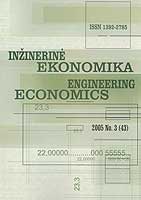Impact of Company’s Leverage on Financial Accounting Method Choice
Impact of Company’s Leverage on Financial Accounting Method Choice
Author(s): Danutė Zinkevičienė, Kristina RudžionienėSubject(s): Economy
Published by: Kauno Technologijos Universitetas
Keywords: accounting method choice; leverage; accounting policy
Summary/Abstract: One of the three main hypotheses of Positive Accounting Theory states “Ceteris paribus, the higher a firm’s debt/equity ratio, the more likely the firm’s manager is to choose accounting procedures that shift reported earnings from future periods to the current period”. This proposition is based on the statement, that a default on a debt contract is costly, so contracts that define a breach in terms of accounting numbers provide managers with incentives to choose accounting procedures that reduce the probability of a breach. They would like to choose procedures that increase assets, reduce liabilities, increase revenue, and decrease expense (i.e., are nonconservative). This hypothesis is being confirmed by empirical research conducted elsewhere, however, influence of leverage on accounting method choice has not been investigated in Lithuania. Correlation analysis indicated, that Leverage hypothesis was not supported in Lithuanian companies, because majority of firms independently from their debt/equity ratio choose income increasing accounting (depreciation of fixed assets and valuation of inventory) methods. Such a choice could be explained by unfavourable tax system for income decreasing accounting methods, also by companies’ attempts to minimise information production costs. While changing tax laws, increasing availability of companies financial accounting data, further research in this field is needed.
Journal: Engineering Economics
- Issue Year: 2005
- Issue No: 5 (45)
- Page Range: 25-30
- Page Count: 6
- Language: English

